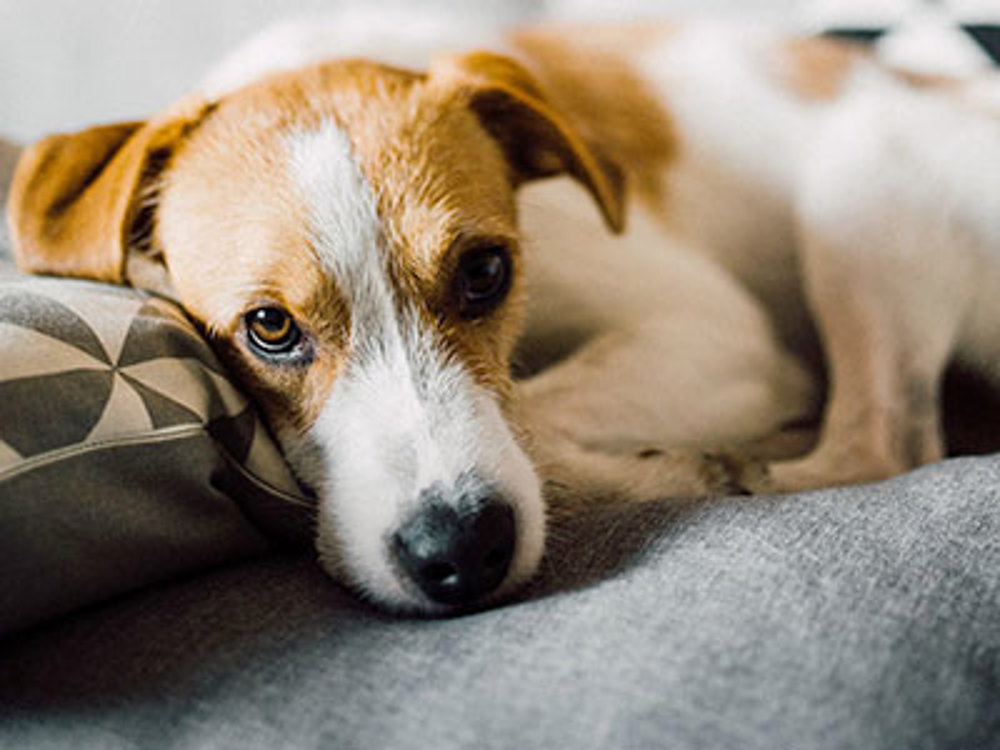
Few things strike as much fear into our hearts as discovering a strange lump on our dog. For most of us, if we found a lump, we'd be keen to get ourselves checked out urgently by a GP. But what about our poorly pets, who rely solely on their owner to decide whether to visit the vet or not?
What is cancer?
Cancer means an abnormal growth of cells and, unfortunately, it's a common disease of all dogs. It may be benign (slow growing and removable) or malignant (aggressive and spreading throughout body). Like in humans, there are many different types of cancer resulting in a huge variation in clinical signs observed.
The statistics
Causes of cancer are largely unknown making prevention extremely difficult, but being aware of possible signs of disease in your dog greatly helps early detection and finding the appropriate care for recovery.
Is a lump always cancer?
Common lumps on dogs vary greatly in size, shape, severity, and whether they're visible to the naked eye or hidden inside your dog. Some conditions resemble lumps but are in fact ticks; their lump-like, pea-sized body requires very careful removal, as a non-cancerous lump known as a 'tick bite granuloma' may form afterwards requiring surgical intervention.
Lumps in older dogs
As with older people, elderly pets are more likely to grow warts and other small growths of the skin or associated structures. These occasionally appear unsightly but are usually non-serious, rarely causing problems or spreading. However, do get your vet to examine your pet to check, and monitor them closely.
Fatty lumps
Lipomas (fatty lumps) tend to be more frequent in overweight dogs, usually presenting as soft, smooth, non-painful lumps under the skin above the ribcage of more mature dogs. These rarely require removal; in fact many non-serious growths are usually 'cosmetic', with surgery indicated only if they cause discomfort, suddenly grow rapidly, interfere with bodily functions (e.g. obstruct passageways), ulcerate, repeatedly get infected or act as a persistent focus for your dog to lick and chew.
Signs of cancer are not always obvious
Cancer may affect any part of your dog's body, often involving whole body systems too (such as skin, lymph nodes, gastrointestinal tract, blood and bone). Be aware that signs of cancer aren't always obvious in the form of new lumps or growths, or changes in size, shape, or consistency of existing lumps. So always get your dog checked by your vet even if you notice any vague signs too.
What are the possible signs of cancer?
The following signs are common with many diseases, but may be your first warning sign of cancer, especially when they don't respond to treatment.
- Vomiting
- Diarrhoea
- Unexplained weight loss
- Excessive drinking
- Excessive urination
- Difficulty urinating
- Being tired
- Not eating
Other signs to watch out for
Other presenting signs include difficulty urinating and bloody urine (common with urinary tract infections), which may also indicate the disease. Prostate cancer will be suspected in any male dog straining to defecate, and passing thin, ribbon-like stools. Any limp or change in gait must also be investigated especially in more at-risk bone cancer breeds, like flat-coated retrievers. Foul breath and excessive drooling - even teeth that have 'moved' - can indicate oral growths that are often some of the more challenging types of cancer to treat.
How will my vet test for cancer?
More serious lumps, such as mammary cancers, mast cell tumours and melanomas, usually require speedy treatment, with surgical removal, x-rays and laboratory tests to confirm identity and prognosis. Often lumps will be sampled (what's known as a 'biopsy') to help direct vets to appropriate therapy.
What treatment may my dog need?
If your vet suspects your dog may be seriously ill, they'll most likely recommend a series of diagnostic tests and suggest treatment options relying on their investigation, the animal's health and even the budget of the owner. Cancer can prove expensive if all treatment options are explored. These can be anything from surgery to chemotherapy, radiation therapy, changing diet or chronic pain relief.
Ethical considerations
The incidence of certain reproductive cancers (such as mammary, prostate, testicular, uterine and ovarian) is greatly reduced by neutering as this removes any influence caused by sex hormones. Bear in mind cancer therapy can be controversial, as it's our choice (not the dog's), so a realistic outlook is essential when considering your options. The growing importance of ethical considerations and palliative care these days must also be recognised, with exciting developments and treatment possibilities being explored every day.
How you can help with canine cancer research
If your dog has been diagnosed with cancer, then you may be able to help further research into scientists' understanding of this complicated disease.
- Requests for biological samples from other research organisations can be found on our site: BARC (Bringing about research collaboration)
Article author
This article was written by Marc Abraham, a vet based in Brighton who regularly appears on UK television.
Think your dog may be affected?
If you're worried about your dog's health, always contact your vet immediately!
We're not a veterinary organisation and so we can't give veterinary advice, but if you're worried about any of the issues raised in this article, please contact your local vet practice for further information.
Find a vet near you
If you're looking for a vet practice near you, why not visit the Royal College of Veterinary Surgeons' Find a vet page.
